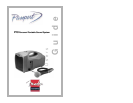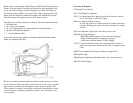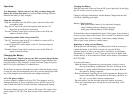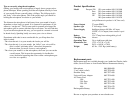
Product Specifications
Model Passport P10 120v part number 069-1110-000
Euro 230v part number 069-1110-060
Aust 240v part number 069-1110-030
UK 230v part number 069-1110-040
100v part number 069-1110-070
(only difference in product is AC line cord)
Power Output 27 watts (RMS)
Speaker type 5” full-range, 4 ohm
Power Supply Intelligent charger 90-260v AC input
18VDC +2.5A output (inner contact is posi
tive)
Battery 12v/ 2.7amp hour rechargeable gel cell
Charging Time 4 hours
Operating Time Up to eight hours talk time
Dimensions (In) 11.2 L x 6.3 W x 7.0 H
(mm) 285 L x 160 W x 178 H
Weight 6.5 lbs. / 2.95 Kgs (with battery)
Replacement parts
Replacement parts are available through your Authorized Fender Audio
dealer, Service Center or from Fender Musical Instruments directly.
Microphone 069-9000-000
3’ mic cable (coiled) 005-7529-000
Shoulder Strap 005-7527-000
Universal Power Adapter 005-7530-000
AC Power Cord
120v 005-7531-000
230v Euro 005-7532-060
230v UK 005-7533-040
100v 005-7534-070
Rechargeable Battery 005-7535-000
Be sure to register your purchase at www.fender.com
Tips on correctly using the microphone
Getting good results with a microphone is largely due to proper micro-
phone technique. When speaking, hold the microphone directly in front
of your mouth. Picture yourself eating a lollipop. The lollipop stick is
the “body” of the microphone. This is the proper angle you should be
holding the microphone in relation to your mouth.
The distance the microphone is held away from your mouth is largely
dependent on how loud you speak. It is common for performers or pre-
senters to “eat the mic”. This is term used for someone who keeps the
microphone grill in contact with their lips at all times. You will find that
if you use the microphone this way, you can speak in a normal voice and
be heard clearly. Speaking loudly can cause your voice to distort.
Experiment with what is most comfortable for you. Keep these few
items in mind.
- The closer the mic is to your mouth, the louder you will be.
- The closer the mic is to your mouth, the “fuller” your voice will be
(this is called “proximity effect” where bass frequencies
increase when you move closer to a microphone).
- The closer your mouth is to the microphone, the lower you can set the
overall output. This lessens the opportunity for feedback to
occur (that awful squealing that occurs when a microphone gets
too close to a speaker).







